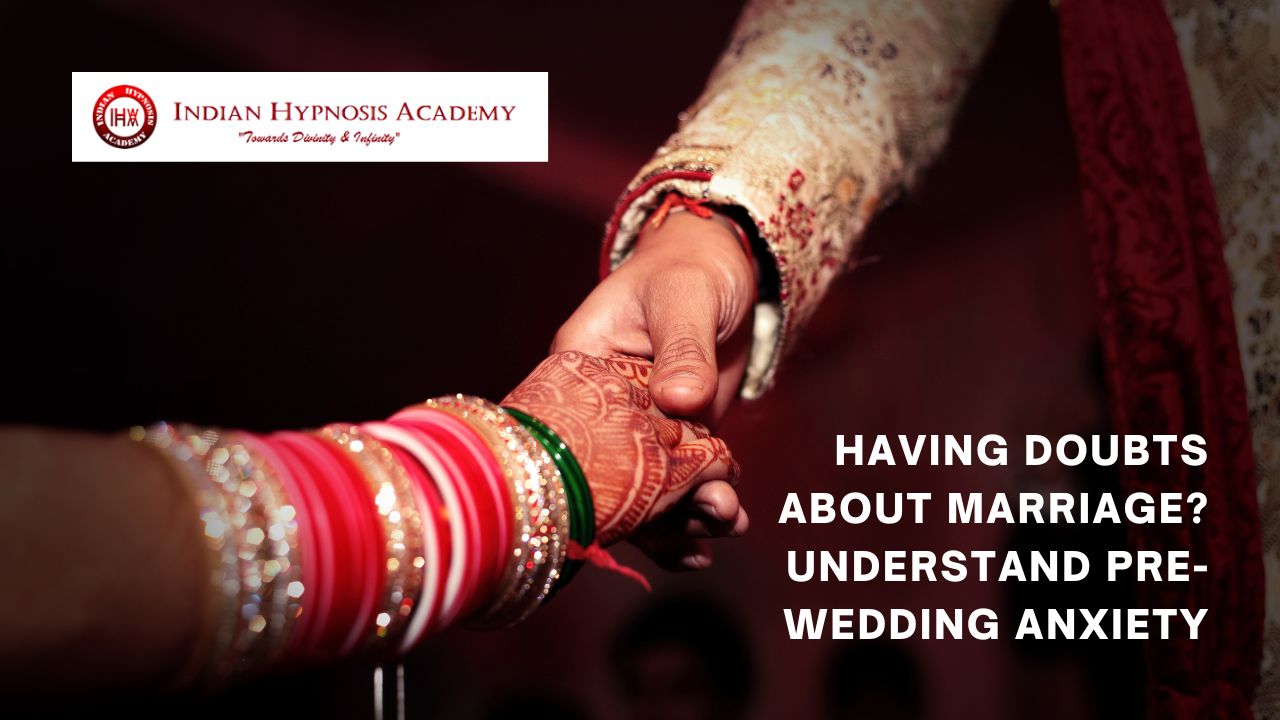Walking down the aisle towards your happily ever after is supposed to be one of the most joyous moments in life. But what if, instead of excitement and anticipation, you find yourself overwhelmed with doubt and anxiety? You’re not alone. Pre-wedding anxiety, also known as pre-wedding jitters, is a common phenomenon that many couples experience before tying the knot. In this blog post, we will delve into the world of pre-wedding anxiety – its causes, signs and symptoms, as well as effective coping strategies to help you navigate through this emotional rollercoaster. So take a deep breath and join us on this journey towards understanding and embracing pre-wedding anxiety!
What is Pre-wedding Anxiety?
Weddings are beautiful celebrations of love and commitment, but they also come with a fair share of stress and anxiety. Pre-wedding anxiety refers to the feelings of unease, fear, or doubt that can arise before your big day. It’s completely normal to experience some degree of nervousness before such a significant life event.
Pre-wedding anxiety can manifest in various ways for different individuals. For some, it may be a general sense of apprehension about the future and the unknown. Others may have specific worries about their compatibility with their partner or concerns about how their lives will change after marriage.
One common cause of pre-wedding anxiety is the pressure to meet societal expectations and create a perfect wedding day. The endless checklist of tasks to complete, guest lists to finalize, and budgets to manage can quickly become overwhelming.
Another factor contributing to pre-wedding jitters is the fear of making irreversible decisions. Marriage signifies a lifelong commitment, and this realization can trigger doubts about whether you’re truly ready for such an immense responsibility.
The influence of family dynamics cannot be underestimated either. Conflicting opinions from parents or extended family members might add extra tension during an already stressful time.
It’s important to remember that experiencing pre-wedding anxiety doesn’t mean your relationship is doomed or that you’ve made the wrong choice. It’s merely a natural response as you embark on this new chapter in your life together.
In the next sections, we’ll explore some signs and symptoms commonly associated with pre-wedding anxiety as well as effective strategies for coping with these emotions so you can approach your special day with greater peace of mind.
Common Causes of Pre-wedding Anxiety
Planning a wedding is undoubtedly one of life’s most exciting experiences. However, it can also bring about a whirlwind of emotions and stress. Pre-wedding anxiety is not uncommon and can be triggered by various factors.
One common cause of pre-wedding anxiety is the fear of change. Getting married means embarking on a new chapter in life, which can be both thrilling and daunting at the same time. The uncertainty of what lies ahead may create feelings of unease.
Another factor that contributes to pre-wedding anxiety is societal pressure and expectations. Couples often feel overwhelmed by the need to have a perfect wedding, meet everyone’s expectations, or live up to certain standards set by society.
Financial concerns are also known triggers for pre-wedding anxiety. Weddings can be costly affairs, and couples may worry about staying within their budget or facing financial strain after the big day.
Family dynamics 12216 can add another layer of stress to an already anxious situation. Conflicting opinions from family members or tensions between different sides can increase feelings of apprehension.
Self-doubt and fear of commitment are frequent culprits behind pre-wedding jitters. It’s natural for individuals to question whether they are making the right choice or if they are ready for such a significant commitment.
Understanding these common causes allows couples to address them head-on and find ways to manage their pre-wedding anxieties effectively.
Signs and Symptoms to Look Out For
When it comes to pre-wedding anxiety, it’s important to be aware of the signs and symptoms that may indicate its presence. While everyone experiences anxiety differently, there are some common indicators to watch out for.
One of the most obvious signs is a feeling of unease or restlessness. You might find yourself constantly worrying about the future or second-guessing your decision to get married. This can lead to difficulty sleeping or concentrating on daily tasks.
Physical symptoms such as rapid heartbeat, trembling, sweating, and stomachaches may also manifest during this time. These physical manifestations are often a result of the body’s response to stress and anxiety.
Emotionally, you might feel irritable, moody, or unusually on edge. Your emotions may fluctuate between excitement and fear as your wedding day approaches. It’s important not to dismiss these emotional fluctuations but instead acknowledge them as part of the process.
Another sign worth noting is an increase in self-doubt or questioning your compatibility with your partner. Thoughts like “Am I making the right choice?” or “Will we be happy together?” may start creeping into your mind more frequently.
You may experience social withdrawal or isolation tendencies due to feelings of overwhelm or uncertainty about sharing your concerns with others.
Remember that experiencing some level of pre-wedding jitters is normal; however if these signs become overwhelming and significantly impact your daily life leading up to your wedding day, it might be helpful seeking professional help for guidance and support along this journey towards marriage
Coping Strategies for Dealing with Pre-wedding Anxiety
1. Practice self-care: Prioritize your well-being by engaging in activities that bring you joy and help you relax. Take time to exercise, meditate, or indulge in hobbies that help alleviate stress.
2. Talk it out: Share your concerns and fears with your partner, friends, or family members who can offer support and reassurance. Sometimes simply talking about your worries can provide a fresh perspective and ease anxiety.
3. Seek professional guidance: Consider seeking therapy or counseling to work through any underlying issues contributing to pre-wedding anxiety. A trained therapist can provide tools and techniques to manage anxious thoughts effectively.
4. Set realistic expectations: Understand that perfection is unattainable, and there will always be bumps along the way. Embrace imperfections as part of the journey towards marriage rather than fixating on them.
5. Focus on the positives: Remind yourself of why you decided to marry your partner in the first place – their qualities, shared values, and love for each other. Shift your focus from anxieties to gratitude for having found someone special.
6. Practice mindfulness: Stay present in the moment instead of allowing future uncertainties to overwhelm you. Mindfulness exercises such as deep breathing or grounding techniques can help calm racing thoughts.
Remember, pre-wedding anxiety is normal but temporary! By implementing these coping strategies into your routine, you are taking proactive steps towards managing this common concern before walking down the aisle.
Communication with Your Partner
Effective communication is a crucial aspect of any relationship, and it becomes even more important when dealing with pre-wedding anxiety. Openly discussing your fears, concerns, and doubts with your partner can help alleviate the burden you may be carrying on your own.
Start by setting aside dedicated time to have an honest conversation about how you’re feeling. Create a safe space where both of you can express yourselves without judgment or interruption. Use “I” statements to clearly communicate your emotions and avoid blaming or accusing language.
Listen attentively to what your partner has to say as well. Show empathy and understanding towards their feelings and thoughts. This will foster a sense of trust and allow for a deeper connection between the two of you.
Consider seeking couples counseling or therapy together if the anxiety persists or becomes overwhelming. A professional can guide both of you in navigating through these turbulent emotions while strengthening your bond as a couple.
Remember that communication is not just about talking; it also involves active listening, non-verbal cues, and mutual respect. By openly communicating with each other, you can address any concerns head-on, find common ground, and work together towards building a strong foundation for your marriage.
Keep in mind that pre-wedding anxiety is normal but temporary because it’s part of the journey towards marriage. Trusting in yourself and in the love you share with your partner will help ease those jitters along the way
Seeking Professional Help
When pre-wedding anxiety starts to take a toll on your mental health and overall well-being, it may be time to consider seeking professional help. Remember, there is no shame in reaching out for support when you need it the most.
A qualified therapist or counselor can provide you with a safe space to explore your fears and concerns about marriage. They can help you identify triggers that contribute to your anxiety and teach you effective coping strategies. Additionally, they can assist in reframing negative thoughts and beliefs into more positive ones.
Therapy sessions can also involve couples counseling, where both partners have the opportunity to express their worries openly and work together towards finding solutions. This not only strengthens communication but also builds a stronger foundation for the future of your relationship.
Remember that seeking professional help does not mean there is something inherently wrong with you or your relationship – it simply means that you prioritize your mental health and want to ensure a happy and fulfilling marriage.
Don’t hesitate to reach out! Your happiness matters, and by seeking professional guidance, you are taking an important step towards addressing pre-wedding anxiety head-on.
Conclusion: Embracing the Journey Towards Marriage
As we have discussed throughout this article, pre-wedding anxiety is a common occurrence that many individuals experience before tying the knot. It is important to understand that having doubts or anxieties about marriage does not necessarily mean that your relationship is doomed or that you should call off the wedding.
Instead of letting pre-wedding anxiety consume you, it’s crucial to recognize it as a natural part of this transformative journey towards marriage. By acknowledging and addressing your fears and concerns, you can work together with your partner to build a solid foundation for a lifelong commitment.
Remember, communication is key in any relationship. Openly discussing your worries with your partner can help foster trust and understanding between both of you. Share your thoughts, concerns, and expectations so that you are on the same page moving forward.
Additionally, seeking professional help from therapists or counselors specialized in pre-marital counseling can provide valuable guidance and support during this time. They can offer unbiased perspectives and effective coping strategies tailored to your specific needs.
It’s essential to remember that no relationship is perfect, and feeling anxious before getting married doesn’t make yours any less valid or strong. Embrace these feelings as an opportunity for personal growth and self-reflection while also nurturing the love between partners.
By understanding pre-wedding anxiety as a normal part of the process rather than something inherently negative or destructive, couples can navigate these uncertainties together successfully. With open communication, patience, empathy, and professional assistance when needed; embarking on this beautiful journey towards marriage becomes all the more fulfilling.
So take heart in knowing that experiencing some jitters before saying “I do” is perfectly normal – after all; it’s called “the big day” for reason! Embrace every emotion along this path with courage and embrace the journey towards building a loving partnership based on trust, understanding, and mutual support.



